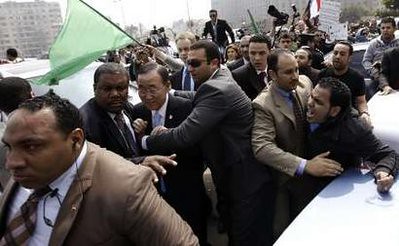
United Nations Secretary General Ban Ki-moon is shielded by guards after coming under attack by demonstrators opposing the imperialist bombing of Libya which was justified by Security Council action., a photo by Pan-African News Wire File Photos on Flickr.
NATO countries take over Libya no-fly zone
Secretary-general says the military alliance's 28 countries have agreed to enforce no-fly zone "to protect civilians"
Last Modified: 25 Mar 2011 01:39
Rasmussen's announcement followed days of negotiations in Brussels
NATO countries have agreed to enforce a no-fly zone in Libya "to protect civilians" against Muammar Gaddafi's forces, Secretary-General Anders Fogh Rasmussen told reporters.
He said the military alliance's mandate did not go beyond the no-fly zone but NATO could also act in self-defence.
He appeared to contradict an earlier statement by Ahmet Davutoglu, Turkey's foreign minister, that NATO would take command of all coalition military operations in Libya.
"At this moment, there will still be a coalition operation and a NATO operation," Rasmussen said. "But we are considering whether NATO should take on that broader responsibility in accordance with the UN Security Council resolution, but that decision has not been made yet."
Talks to unite both missions and transfer control of the broader campaign to NATO would continue through the weekend with a decision expected by Monday, NATO officials said.
Until then, the bombing campaign against Gaddafi's tanks and artillery, which kicked off six days ago, will stay in the hands of the coalition led by the United States, Britain and France for the moment.
Rasmussen's announcement followed days of negotiations and a breakthrough on Thursday when Turkey agreed to back the plan.
All 28 members of NATO needed to back any agreement and Turkey had previously rejected backing any plan unless it was given assurances that the operation would be limited to protecting civilians, enforcing an arms embargo and a no-fly zone, and providing humanitarian aid.
Transfer of command
After the announcement of the agreement, US Secretary of State Hillary Clinton declared that the US was taking the next step in military operations against Libya by transferring command and control of the no-fly zone to NATO.
Clinton said NATO had agreed to protect Libyan civilians, enforce the UN arms embargo on the North African country and support humanitarian aid efforts there.
She also said all members of the alliance had authorised military authorities to develop an operations plan for NATO to take on the broader civilian protection mission under resolution 1973.
She said the coalition action had made "significant" progress in Libya.
"Gaddafi's troops have been pushed back, but they remain a serious threat to the safety" of the Libyan people, she said.
She also praised the United Arab Emirates for becoming the second Arab country after Qatar to send planes to help the mission. The UAE will deploy 12 planes, according to French President Nicolas Sarkozy.
Clinton said she will travel to London next week to coordinate the strategy and military operation against Gaddafi's regime.
The US has been trying to give up the lead role in the operation against Gaddafi's forces.
Washington also pressed for a quick transfer of command to NATO with several key allies, including Britain and Italy, pushing for the alliance to run the show.
Navy Vice Admiral William Gortney told reporters at the Pentagon that the US will continue to fly combat missions as needed, but its role will mainly be in support missions such as refuelling allied planes and providing aerial surveillance of Libya.
No compliance
Meanwhile, UN Secretary-General Ban Ki-moon said there were no signs that Gaddafi's government was complying with UN Security Council demands for an immediate cease-fire.
"There is no evidence that Libyan authorities have taken steps to carry out their obligations under resolutions 1970 or 1973," Ban told the Security Council.
He was referring to two council resolutions that called for an immediate end to hostilities and imposed a no-fly zone over the country.
Ban said his special envoy to Libya, former Jordanian Foreign Minister Abdelilah Al-Khatib, had personally warned Gaddafi's government the council may take further steps if Libya did not comply with last week's cease-fire demand by the Security Council in resolution 1973.
"The special envoy emphasised that it was in Libya's best interests to cease hostilities and change the dynamics of the crisis," Ban said. "If Libya did not act, the envoy stated, the Security Council may be prepared to take additional measures."
Council members discussed the crisis in Libya behind closed doors on Thursday but took no action.
Al-Khatib will attend a meeting on Libya in Addis Ababa on Friday hosted by the African Union, Ban said after the meeting.
"Representatives of both the Libyan government and the opposition will attend, I was told, as well as relevant member states and regional organisations," he told reporters.
Ban added the military operations in Libya were not aimed at regime change, but solely to protect civilian.
About 336,000 people have fled Libya since the beginning of the crisis, he said, adding that the UN had contingency plans to deal with as many as 250,000 new refugees.
Source: Agencies
No comments:
Post a Comment